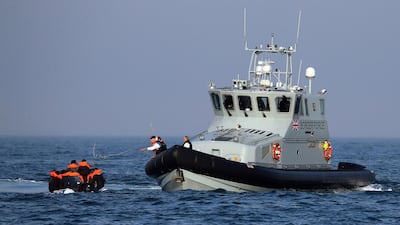Britain’s immigration minister is in Paris on Tuesday seeking to persuade the French government to do more to prevent migrants crossing the English Channel in small boats.
More than 4,000 people have made the illegal crossing to Britain so far this year – a record high – and the UK has responded to the surge by calling in the military and attempting to put pressure on France to stop migrants leaving its shores in the first place.
The ruling Conservative Party said it would bring in stricter immigration rules with Brexit but has been unable to prevent hundreds of people crossing every day during calm weather in August. It has sought to blame criminal gangs for exploiting migrants who turn up in northern France seeking a new life in Europe.
The UK Home Secretary, Priti Patel, said she wanted to make it “unviable” for people to travel to the UK illegally but France has reportedly requested £30 million (Dh144m) to bolster security on its side of one of the world’s busiest shipping lanes.
"The number of illegal small boat crossings we have seen recently is totally unacceptable," she said.
"Our operational partners are dealing with complex challenges associated with them and collectively with the French we need make this route unviable.
"Across government we are absolutely committed to shutting down this route and we will bring down the criminal gangs that facilitate these illegal crossings."
Immigration Minister Chris Philp was in Paris on Tuesday to discuss further measures after the UK’s payment of £114m to France since 2015 had failed to stop the crossings from rising.
A French politician told the BBC that the decision to use naval boats in the Channel was a “political measure” that would not change anything.
“What is the British navy going to do if it sees a small boat?” Pierre-Henri Dumont, who represents the port town of Calais. “Is it going to shoot the boat? Is it going to enter French waters?”
The British air force has sent a surveillance aircraft to back up its efforts in the Channel.
Most illegal immigrants to the UK travel inside lorries but increased security measures close to truck stops have seen an increasing number attempt the risky crossing of the waterway at its narrowest point, where it is 33 kilometres wide.

